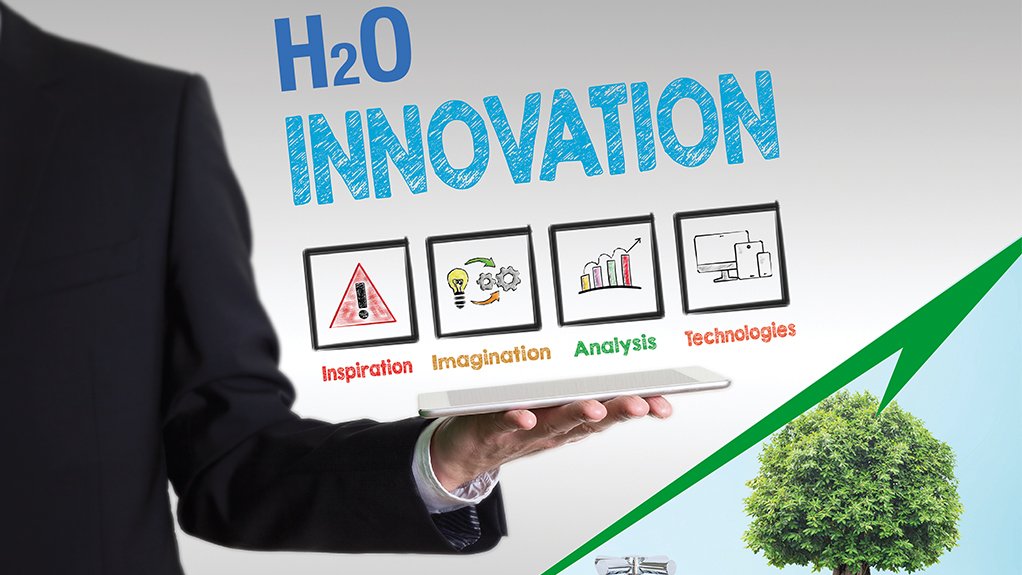Local cloud-based innovation network for quality H20
Water leaks and non-revenue water, dysfunctional water and wastewater infrastructure, high-cost water treatment technologies, poor water planning and accountability, dwindling water resources and deteriorating water quality are some of the water challenges the Council for Scientific and Industrial Research (CSIR) aims to tackle through its Water Centre.
The entity researches, develops, and has introduced, bespoke technology, software and tools, centred around three interlinked thematic areas: smart water and wastewater infrastructure, smart water analytics and solutions and smart water use, to improve water resources resilience and ensure availability of high quality water.
“We cover the entire water value chain from catchment to the tap through these focus areas, with the technologies based on the current challenges that we are experiencing,” says CSIR Water Centre manager Dr Rembu Magoba.
The various technologies are piloted in a live environment in partnership with municipalities or water utilities. CSIR is also establishing a Water Technology Demonstration site in its Pretoria campus to support local technology development in this space.
As the team develops technologies, it urges municipalities or water utilities that are experiencing water challenges to partner with the Centre and open their facilities as a testbed.
The Water Centre is currently piloting its Smart Water Network Management tool at a local water utility, with positive outcomes, Magoba highlights, noting that the tool’s aim is to reduce water losses and non-revenue water, lost through leaks, burst pipes or illegal connections, which accounts for over 40% of water.
Based on smart metering, monitoring and control, the technology, linking sensors on the distribution network to the servers and collecting data remotely and wirelessly, alerts the user, with geolocation, to any abnormalities detected within their water network and systems, enabling an immediate response.
The Water Centre’s Smart Water Use App, meanwhile, is a smartphone application developed to assist farmers, particularly those experiencing droughts, to maximise water use for their crops.
The application was successfully validated in 16 apple orchards located in four farms during beta testing. The app calculates both the reference evapotranspiration and the crop coefficients, thereby forecasting the water requirements of apple orchards, one to seven days in advance, which is critical for irrigation scheduling and water allocation planning to yield the desired crops.
The team is now exploring opportunities to include other crop types to further expand the technology and is currently working on crops like Mango, litch, citrus, pears and tomatoes, as well as crop types specific to the needs of Limpopo province as part of the climate resilience programme being piloted for small holder farmers in the province.
Magoba highlights the Water Centre’s mobile Decentralised Wastewater Treatment System (Dewats) that can be deployed as needed to small community-based settlements, schools, industrial parks, rural areas and peri-urban communities, where there is limited or no formal sanitation network.
Dewats, which is being piloted at a Gauteng school in partnership with the Department of Education, delivers quality treated wastewater that can be used for different purposes, including flushing toilets and irrigation, at the point of source, with the solids obtained from the treatment systems used as fertilisers within the same site to support gardens.
Another successful initiative is the Phycoremediation for Ponds Systems, which is a cost-effective biological way of treating wastewater within one to three days without electricity, chemicals or a skilled workforce. The phycoremediation technology decreases eutrophication in rivers receiving domestic wastewater by treating it with algae specifically cultivated to remove nutrients from the water column.
“Piloted in partnership with the Mossel Bay municipality and the Bitterfontein wastewater treatment plant in the Western Cape, we are able to get the sewage from the wastewater treatment plant into their ponds, mixing the wastewater with the cultured algae from the water tanks. The treated wastewater may also be used to irrigate gardens in the community.”
The testing found that the technology discharged water that was also safe for the environment, enabling industry to dispose of its wastewater in line with its compliance obligations and meet prescribed environmental standards.
“Our partnerships with the water sector stakeholders, including the departments of Water and Sanitation and Science and Innovation, water boards, Water Research Commission, the South African Local Government Association and Research Councils, among other key water institutions, as well as the private sector, will be key in ensuring that we deliver water services in South Africa, especially to the rural parts of our country and disaster stricken areas,” he concludes.
Interested stakeholders are encouraged to collaborate with the CSIR and explore their suite of R&D offerings in the water research space.
Dr Rembu Magoba:
Email: RMagoba@csir.co.za
Tel: 012 841 3696
Article Enquiry
Email Article
Save Article
Feedback
To advertise email advertising@creamermedia.co.za or click here
Announcements
What's On
Subscribe to improve your user experience...
Option 1 (equivalent of R125 a month):
Receive a weekly copy of Creamer Media's Engineering News & Mining Weekly magazine
(print copy for those in South Africa and e-magazine for those outside of South Africa)
Receive daily email newsletters
Access to full search results
Access archive of magazine back copies
Access to Projects in Progress
Access to ONE Research Report of your choice in PDF format
Option 2 (equivalent of R375 a month):
All benefits from Option 1
PLUS
Access to Creamer Media's Research Channel Africa for ALL Research Reports, in PDF format, on various industrial and mining sectors
including Electricity; Water; Energy Transition; Hydrogen; Roads, Rail and Ports; Coal; Gold; Platinum; Battery Metals; etc.
Already a subscriber?
Forgotten your password?
Receive weekly copy of Creamer Media's Engineering News & Mining Weekly magazine (print copy for those in South Africa and e-magazine for those outside of South Africa)
➕
Recieve daily email newsletters
➕
Access to full search results
➕
Access archive of magazine back copies
➕
Access to Projects in Progress
➕
Access to ONE Research Report of your choice in PDF format
RESEARCH CHANNEL AFRICA
R4500 (equivalent of R375 a month)
SUBSCRIBEAll benefits from Option 1
➕
Access to Creamer Media's Research Channel Africa for ALL Research Reports on various industrial and mining sectors, in PDF format, including on:
Electricity
➕
Water
➕
Energy Transition
➕
Hydrogen
➕
Roads, Rail and Ports
➕
Coal
➕
Gold
➕
Platinum
➕
Battery Metals
➕
etc.
Receive all benefits from Option 1 or Option 2 delivered to numerous people at your company
➕
Multiple User names and Passwords for simultaneous log-ins
➕
Intranet integration access to all in your organisation




















